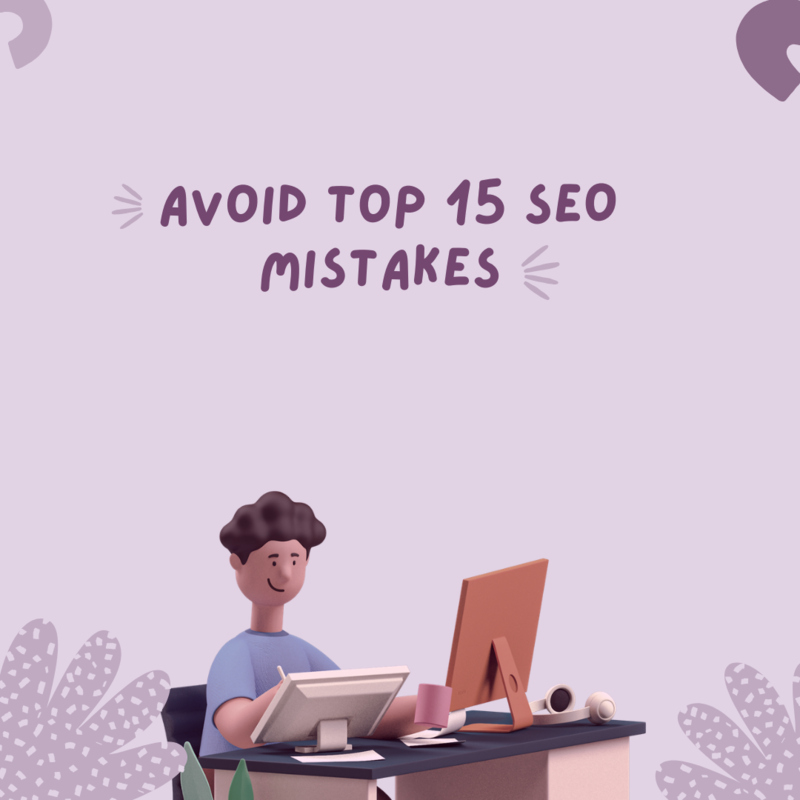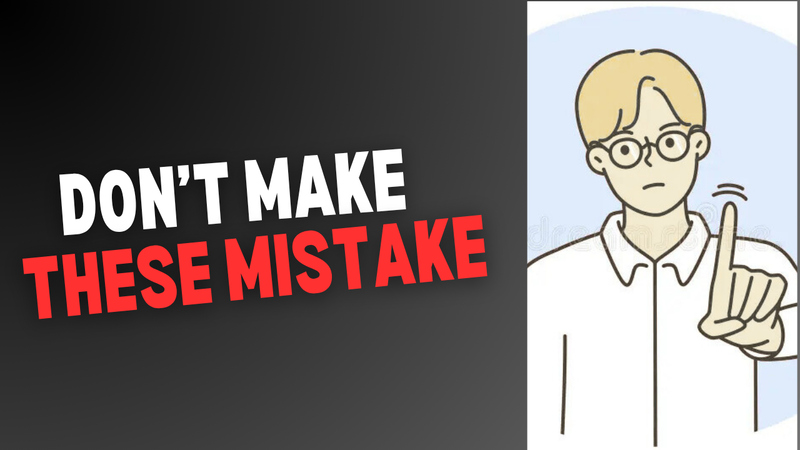Search Engine Optimization (SEO) is the backbone of online visibility. But as Google and other search engines continue to evolve, so do the mistakes people make. Whether you’re a beginner just starting or an expert fine-tuning your strategy, avoiding common SEO errors is critical in 2025 to maintain and boost your rankings.
In this comprehensive guide, I’ll walk you through the top 15 SEO mistakes that could be sabotaging your site — and, more importantly, how to fix them effectively.

1. Ignoring Mobile Optimization
Why it matters:
More than 60% of global internet traffic comes from mobile devices, and Google’s indexing has shifted to mobile-first. If your site isn’t mobile-friendly, search engines will rank you lower, and your visitors will have a poor experience.
Common issues:
- Text is too small to read on phones
- Buttons and links are too close together.
- Slow loading on mobile networks
- Non-responsive design that doesn’t adapt to screen sizes
How to fix:
- Choose a responsive WordPress theme that automatically adjusts layouts for all devices.
- Use Google’s Mobile-Friendly Test to analyze your pages.
- Optimize images and avoid heavy scripts that slow loading on mobiles.
2. Not Understanding Search Intent
Why it matters:
Search intent is why someone searches for a keyword — are they looking for information, a product, or to solve a problem? Ignoring intent leads to irrelevant content that users quickly leave, increasing your bounce rate.
Types of search intent:
- Informational: User wants to learn something
- Navigational: User looks for a specific website or page
- Transactional: User intends to buy or convert
How to fix:
- Research your keywords thoroughly. Use tools like Ahrefs or SEMrush to see what types of content rank for your target keywords.
- Create content that matches the intent — e.g., blog posts for informational queries, product pages for transactional ones.
3. Keyword Stuffing
Why it matters:
Keyword stuffing is the overuse of a keyword on a page. It used to help with SEO, but now it’s considered one of the most harmful SEO mistakes, as it triggers Google penalties and ruins readability.
Symptoms of keyword stuffing:
- Repeating the same word unnaturally many times
- Content sounds robotic or spammy.
- Keywords stuffed in headings or meta tags without context
How to fix:
- Write for humans first — make your content natural and engaging.
- Use LSI keywords (related terms and synonyms) to give context. For example, if your keyword is “best SEO tools,” use terms like “SEO software,” “keyword research tools,” etc.
- Keep keyword density around 1-2%.
4. Missing or Weak Title Tags and Meta Descriptions
Why it matters:
Title tags and meta descriptions appear in search results and influence whether users click on your link. Weak or missing tags mean fewer clicks and lower rankings.
How to fix:
- Write unique, descriptive, and keyword-rich title tags under 60 characters.
- Create compelling meta descriptions under 160 characters that summarize the page’s content and include a call to action.
- Use SEO plugins like Yoast SEO or Rank Math to optimize and preview these easily in WordPress.
5. Slow Website Speed
Why it matters:
Website speed affects user experience and rankings. Neglecting site speed is one of the most common SEO mistakes, especially with Google’s Core Web Vitals update focusing heavily on loading time, interactivity, and visual stability.
Common causes of slow speed:
- Large uncompressed images
- Too many plugins or scripts
- Poor hosting service
How to fix:
- Compress images using tools like TinyPNG or ShortPixel.
- Use caching plugins such as WP Rocket or W3 Total Cache.
- Choose a reliable, fast hosting provider optimized for WordPress (like SiteGround or WPX Hosting).
- Minimize CSS and JavaScript files.
6. Duplicate Content Issues
Why it matters:
Google dislikes duplicate content because it confuses which page to rank. Duplicate content can lead to ranking penalties or split page authority. Duplicate Content Issues is the very problem for SEO mistakes.
Common sources:
- Copying content from other sites
- Multiple URLs showing the same content (e.g., with and without “www”)
- Pagination issues
How to fix:
- Always write original and unique content.
- Use canonical tags to tell search engines which version of a page is primary.
- Use tools like Copyscape to detect plagiarism.
7. Not Using HTTPS (SSL Certificate)
Why it matters:
Google gives ranking preference to HTTPS websites. More importantly, users trust a secure site for transactions and data privacy.
Failing to secure your site with HTTPS is one of the most overlooked SEO mistakes that can hurt both your rankings and credibility.
How to fix:
- Install a free SSL certificate from Let’s Encrypt via your hosting provider.
- Make sure all internal links use HTTPS, and set up 301 redirects from HTTP to HTTPS.
8. Neglecting Internal Linking
Why it matters:
Internal links help Google crawl your site better and distribute page authority. They also keep visitors engaged by guiding them to related content.
How to fix:
- Link to relevant pages and posts naturally within your content.
- Use descriptive anchor text that includes keywords where appropriate.
- Build a logical hierarchy with categories and subcategories.
9. Missing Image Alt Text
Why it matters:
Alt text helps search engines understand your images and improves accessibility for users with disabilities.
How to fix:
- Add descriptive alt text to every image, incorporating relevant keywords without keyword stuffing.
- Use concise descriptions (e.g., “red running shoes on white background”).
10. Broken Links
Why it matters:
Broken links frustrate users and reduce your site’s credibility, causing higher bounce rates and lower SEO rankings.
How to fix:
- Regularly scan your site with tools like Broken Link Checker or Screaming Frog.
- Fix or remove any broken links immediately.
11. Not Submitting an XML Sitemap
Why it matters:
An XML sitemap helps search engines discover and index all your important pages quickly.
How to fix:
- Use SEO plugins like Yoast or Rank Math to generate a sitemap automatically.
- Submit your sitemap to Google Search Console and Bing Webmaster Tools.
12. Ignoring Local SEO
Why it matters:
If you have a local business, ignoring local SEO means missing out on potential customers in your area.
How to fix:
- Create and optimize a Google Business Profile with up-to-date info and photos.
- Use local keywords (city, neighborhood names) in your content and metadata.
- Encourage customers to leave positive reviews.
13. Thin Content with No Value
Why it matters:
Thin or shallow content fails to answer users’ questions fully and is unlikely to rank well in 2025’s competitive search landscape, making it one of the critical SEO mistakes to avoid.
How to fix:
- Write detailed, well-researched articles with at least 1,000 words.
- Use headings, bullet points, images, and examples to enhance readability.
- Update content regularly to keep it fresh.
14. Not Tracking SEO Performance
Why it matters:
Without tracking your SEO efforts, you won’t know what’s working or what needs improvement.
How to fix:
- Set up Google Analytics and Google Search Console on your site.
- Use tools like Ahrefs, SEMrush, or Ubersuggest to monitor keyword rankings and backlinks.
- Regularly review reports and adjust your SEO strategy accordingly.
15. Overlooking Technical SEO
Why it matters:
Technical issues like crawl errors, poor site architecture, and missing schema markup can prevent your pages from ranking well.
How to fix:
- Audit tools like Screaming Frog, Sitebulb, or SEMrush can be used to identify technical problems.
- Fix crawl errors, improve URL structure, and add schema markup for rich snippets.
- Ensure your site is secure, fast, and easy to navigate.

Final Thoughts on Avoiding SEO Mistakes in 2025
SEO in 2025 requires more than just keywords — it demands a comprehensive strategy that puts user experience first. Avoiding these common mistakes can help you climb the search rankings faster and maintain sustainable growth.
Whether you’re just starting out or looking to refine your SEO, reviewing and fixing these issues will keep you ahead of your competition.

